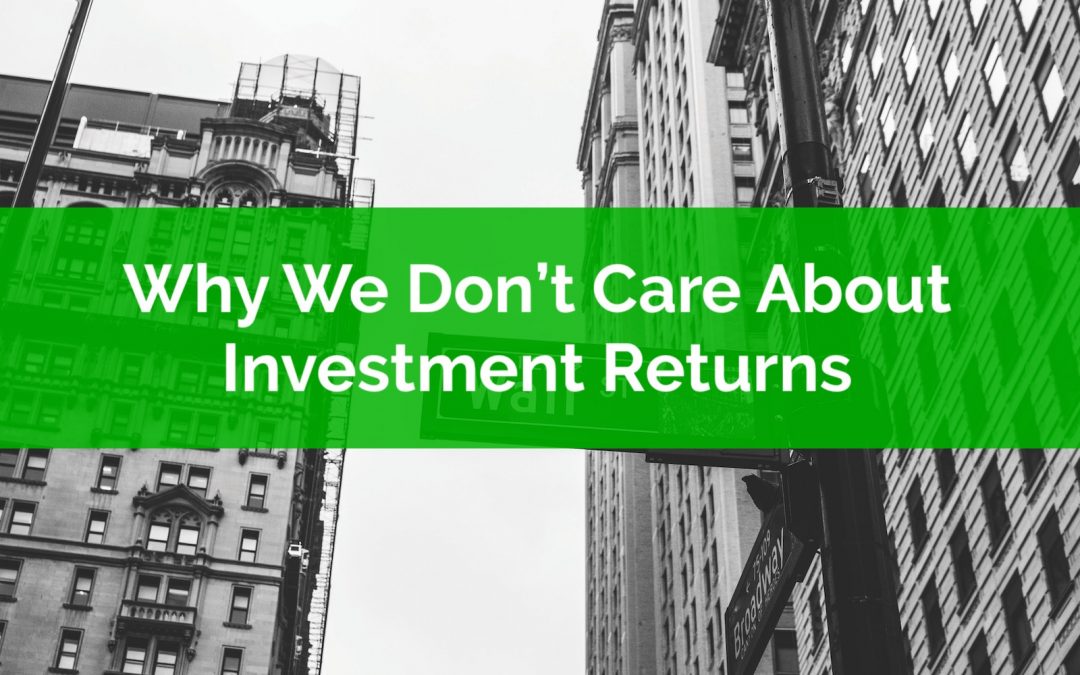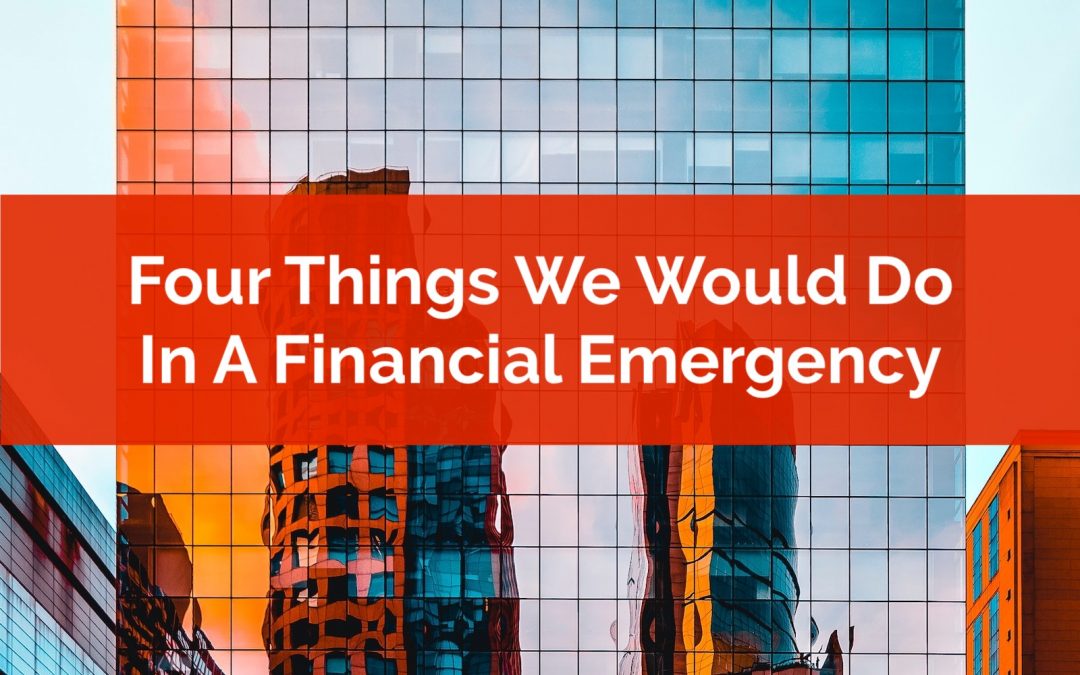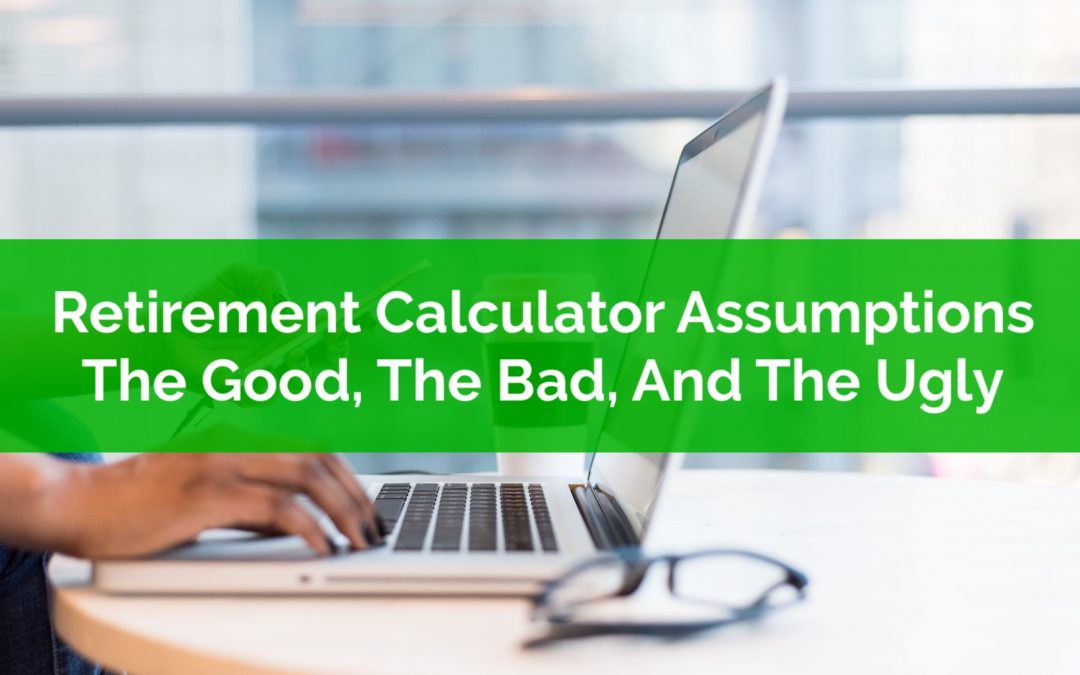“Welcome to the PlanEasy blog! We make personal finance easy.
Thanks for visiting.”
– Owen

Why We Don’t Care About Investment Returns
This is the time of year when everyone starts talking about investment returns. It’s been a wild ride and just months ago it would have been difficult to imagine reaching positive investment growth year over year. With the incredible ups and downs of this year, investment returns are bound to be in the headlines over the next few months.
For some people, investment growth is an important metric. They care about time weighted returns, money weighted returns, and breaking down their year over year growth by geography, sector, and even individual investments.
We, however, don’t care about investment returns.
In fact, I couldn’t tell you what our year over year returns have been this year or in past years. The only way we’d know is because our discount broker likely tracks that for us. Otherwise it’s just not a personal finance metric we put much value in.
Of course, we do care about long-term returns, but we don’t care about year over year returns, and here’s why you shouldn’t either…

Four Things We Would Do In A Financial Emergency
What would you do in a financial emergency? What steps would you take? Do you have a plan in place?
It turns out that nearly 4 out of 10 people don’t have even a basic plan for a financial emergency. In the latest Financial Planning Canada survey, nearly 40% of respondents said they do not have an emergency fund.
While that stat is pretty alarming, the good news is that 6 out of 10 people are saving for an emergency, but is that the only thing you can do?
Our plan includes multiple layers of protection if we were faced with a major financial emergency. There are four key things that we would do. These four things would allow us to cover basic expenses for 5+ years! How’s that for peace of mind!
This 5-year “safety net“ wasn’t something that we created overnight, but we’re thankful we now have a strong plan just in case the worst were to happen. We hope to never get to that point, but it’s nice knowing we have a solid plan that’s ready to go in case things get really, really tough.
Here are the four things we would do in a financial emergency…

Retirement Calculator Assumptions: The Good, The Bad, And The Ugly
Retirement calculators are everywhere. Nearly every financial institution has some form of retirement calculator. They all work very similarly, they require a few inputs perhaps age, income, spending etc. and then they provide some analysis/recommendation about retirement, how much to save, how much to spend etc.
But how accurate are these retirement calculators? What assumptions are they making when doing a retirement projection? Are they even worth the effort?
In this post we’re looking at some of the good, the bad, and the ugly parts of retirement calculators.
In general, retirement calculators make some very broad assumptions to create a very simple retirement projection very quickly. There is nothing simple about retirement, so creating a projection with only a few inputs in only a few seconds is already somewhat suspect, but as we’ll see below, the possible issues go way beyond that.
These are just some of the issues to watch out for when using a retirement calculator.

Owen Winkelmolen
Advice-only financial planner, CFP, and founder of PlanEasy.ca
“Welcome to the PlanEasy blog! We make personal finance easy.
Thanks for visiting.”
– Owen
New blog posts weekly!
Tax planning, benefit optimization, budgeting, family planning, retirement planning and more...

Why We Don’t Care About Investment Returns
This is the time of year when everyone starts talking about investment returns. It’s been a wild ride and just months ago it would have been difficult to imagine reaching positive investment growth year over year. With the incredible ups and downs of this year, investment returns are bound to be in the headlines over the next few months.
For some people, investment growth is an important metric. They care about time weighted returns, money weighted returns, and breaking down their year over year growth by geography, sector, and even individual investments.
We, however, don’t care about investment returns.
In fact, I couldn’t tell you what our year over year returns have been this year or in past years. The only way we’d know is because our discount broker likely tracks that for us. Otherwise it’s just not a personal finance metric we put much value in.
Of course, we do care about long-term returns, but we don’t care about year over year returns, and here’s why you shouldn’t either…

Four Things We Would Do In A Financial Emergency
What would you do in a financial emergency? What steps would you take? Do you have a plan in place?
It turns out that nearly 4 out of 10 people don’t have even a basic plan for a financial emergency. In the latest Financial Planning Canada survey, nearly 40% of respondents said they do not have an emergency fund.
While that stat is pretty alarming, the good news is that 6 out of 10 people are saving for an emergency, but is that the only thing you can do?
Our plan includes multiple layers of protection if we were faced with a major financial emergency. There are four key things that we would do. These four things would allow us to cover basic expenses for 5+ years! How’s that for peace of mind!
This 5-year “safety net“ wasn’t something that we created overnight, but we’re thankful we now have a strong plan just in case the worst were to happen. We hope to never get to that point, but it’s nice knowing we have a solid plan that’s ready to go in case things get really, really tough.
Here are the four things we would do in a financial emergency…

Retirement Calculator Assumptions: The Good, The Bad, And The Ugly
Retirement calculators are everywhere. Nearly every financial institution has some form of retirement calculator. They all work very similarly, they require a few inputs perhaps age, income, spending etc. and then they provide some analysis/recommendation about retirement, how much to save, how much to spend etc.
But how accurate are these retirement calculators? What assumptions are they making when doing a retirement projection? Are they even worth the effort?
In this post we’re looking at some of the good, the bad, and the ugly parts of retirement calculators.
In general, retirement calculators make some very broad assumptions to create a very simple retirement projection very quickly. There is nothing simple about retirement, so creating a projection with only a few inputs in only a few seconds is already somewhat suspect, but as we’ll see below, the possible issues go way beyond that.
These are just some of the issues to watch out for when using a retirement calculator.
Join over 250,000 people reading PlanEasy.ca each year. New blog posts weekly!
Tax planning, benefit optimization, budgeting, family planning, retirement planning and more...
Join over 250,000 people reading PlanEasy.ca each year. New blog posts weekly!
Tax planning, benefit optimization, budgeting, family planning, retirement planning and more...
